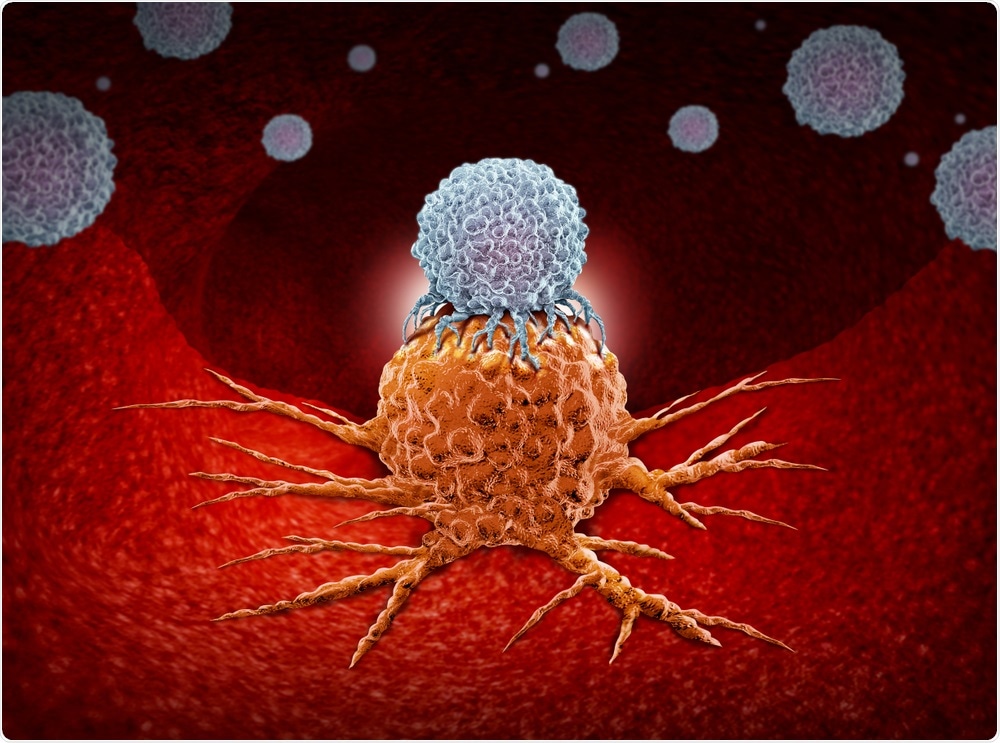
Patients on immunotherapies should consume more fiber, fewer probiotics
A new study has found that taking probiotics could drastically reduce the response of cancer patients to immunotherapy. Probiotics are freely available without prescription and are not regulated by the US Food and Drug Administration.

Lightspring | Shutterstock
On the other hand, patients on a fiber-rich diet showed a five-fold increase in response. The study was presented on April 2, 2019, at the American Association for Cancer Research (AACR) Annual Meeting 2019.
The pioneering study was carried out by the Parker Institute for Cancer Immunotherapy (PICI) and The University of Texas MD Anderson Cancer Center. It explored the links between the diet of cancer patients, their gut microflora and their response to immunotherapy.
The study showed that modifiable lifestyle factors could influence the gut microbiome and immunotherapy response in cancer patients.
Probiotic supplements reduced responses by 70%
The study looked at 113 patients with metastatic melanoma who were starting immunotherapy at Houston’s MD Anderson. Around 42% of these patients were taking over-the-counter probiotic supplements.
There was a 70% reduction in the odds that they would respond favorably to cancer immunotherapy with anti-PD-1 checkpoint inhibitors.
Poor diet has been linked to a worse response
One possible explanation, according to the researchers, could be the reduced diversity of gut bacteria with probiotic supplementation. This is already known to affect the response to immunotherapy.
The gut microbiome, which is composed of billions of intestinal bacteria, helps regulates the human immune system.
Checkpoint inhibitors act via the immune defenses against cancer. Thus, influencing the composition of the gut flora could, in theory at least, be one way to potentiate cancer immunotherapy by stimulating immune function.
In keeping with this hypothesis, patients who ate a lot of whole grains (a good source of fiber, among other benefits) had a more diverse gut microbiome and better immunotherapy response.
Those who preferred processed meats and more sugar in their diets had fewer microflora species in their gut and showed a poorer response.
The results were ‘surprising’
While the other observations are not unexpected, the current study questions the general assumption that probiotics enhance gut health in cancer patients.
Study author Christine Spencer called the findings “a bit surprising” and said more research would be needed to follow up this conclusion.
Jennifer Wargo confirmed this, saying, “Based on our early results, cancer patients and doctors should carefully consider the use of over-the-counter probiotic supplements, especially before beginning immunotherapy treatment.”
Eating a high-fiber diet has long been shown to have health benefits. In this case, we see signs that it is also linked to a better response to cancer immunotherapy.”
The results guide the development of new drugs
Anti-PD-1 checkpoint inhibitors are only successful in 20-30% of patients. Researchers are now searching for ways to enhance their effectiveness by regulating the diet and/or supplement intake. As Spencer points out, the study suggests an important relationship between diet, the gut microbiome, and response to immunotherapy, which needs to be further studied and exploited.
Says Spencer, “The gut microbiome plays a big role in moderating the immune system, so the idea that we could potentially change the microbiome—whether by diet or other means—to improve response to immunotherapy treatment is really exciting.”
Earlier research suggests gut diversity is important for immunotherapy responses
An earlier study by the same researchers, in 2018, reported that greater gut bacterial diversity enhanced the response to checkpoint inhibitors.
In particular, bacteria from the Ruminococcaceae family were linked to a better response to anti-PD-1 checkpoint inhibitors. In contrast, members of the order Bacteroidales predicted a worse outcome.
Thus there were two different types of microbiome profiles in terms of the patient’s response to checkpoint inhibitors.
In the current study, the ‘responder’ profiles from the earlier study served as a surrogate marker for a favorable microbiome, that is, one associated with a good response to immunotherapy.
Fecal samples from the patients were used to determine the gut microbiome profile at the beginning of the study. In addition, patients were assessed for dietary characteristics, medications, and supplements using a lifestyle questionnaire.
Subsequent correlations between the diet and the gut microbiome composition were picked out and examined against the immunotherapy response in the subset of patients treated with anti-PD-1 checkpoint inhibitors.
Probiotic intake and high dietary fiber were linked with greater and lesser gut flora diversity, respectively, and also with a poorer and better outcome following cancer immunotherapy.
Factors such as age, sex, and body mass index had no significant effects on the gut microbiome profile.
Researchers will now examine the role of diet in immunotherapy responses
Other randomized controlled trials are now underway to examine whether dietary factors, fecal transplants, or other such means can alter the gut flora and thus improve cancer immunotherapy outcomes.
One such trial at the Parker Institute, in collaboration with MD Anderson and Seres Therapeutics, is looking at whether a customized pill containing selected oral microflora could improve the response to checkpoint inhibitors.
Another study at MD Anderson plans to explore whether and how different types of diet affect the gut microbiomes of cancer patients, and how these patients respond to immunotherapy.



































No hay comentarios:
Publicar un comentario